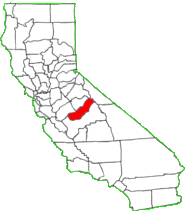|
THEODORE THURE STROMBECK
Theodore Thure Strombeck was born in 1829 in
Stockholm, Sweden, the son of a Collector of the Court. He ran away from
home when he was 16 and went to sea as a cabin boy for two years.
In 1847 his ship sailed into the harbor of Yerba Buena, now San Francisco,
where he left it.
When gold was discovered, Strombeck rigged
up a launch and started up the San Joaquin River to Stockton, which then
was the main distributing point to the mining country. After two years
shipping freight, Strombeck made another move to the southern mines and
at Coarsegold Gulch and the Fresno River he not only engaged in mining
but also supplied the adjacent camps with meat. Since there were no roads
at the time his supplies had to be taken over the trails by Pack train.
By that time, the summer of 1851, the Fresno River country was well populated.
About that time Strombeck gave himself the name of "Swede Bill."
Many of the Indians in the lower hills were
friendly but the Monos, living along the Sierra ranges, viewed the white
man with distrust. Warfare developed when Monos murdered two men at Fine
Gold, a mining camp a few miles from Coarsegold. The Mariposa Battalion
was formed to go in pursuit of the Indians, and Strombeck was a member
of the expedition. Strombeck was in Company B, commanded by Captain John
Boling. Major James D. Savage headed the battalion which discovered
Yosemite Valley and gave it its name after the Indian tribe found as its
inhabitants. Strombeck was one of the first to see its beauties.
Strombeck's ranch here at Coarsegold was the
rancheria of the Chukchansi tribe of Indians, many whom still are residents
of the district. He married Memerite Melliot, the daughter of Chief Hawa
of the Chuckchansi Indians. The daughters are Mrs. J. H. Elam of Coarsegold,
Mrs. Fred O. Ninnis of Fresno, Mrs. Mary Jones of Coarsegold and Kathryn
Strombeck. The sons included Fred, William, Leonard, Charles and John Strombeck.
The Strombeck property later belonged to Will Krohn
and is now the home of Mr. and Mrs. Charles Wells.
Another of the ranches is known as The Crossing,
situated where the Raymond-Coarsegold Road crosses the Fresno River,
six miles west of Coarsegold. The first post was an adobe building erected
by John Ledford and George W. Carson. It was sold shortly after to J. L.
Hunt and J. R. Nichols, and Nichols in turn, sold his holdings to J. R.
Roan. The adobe was built in 1852. Three Frenchman left the Hunt &
Roan post during the summer of '52 on a prospecting trip to the higher
country. Two were killed by a band of Indians, the third made his way back
to Coarsegold Gulch. From there a band of thirty miners went back with
him, found the bodies near the valley and after burying them returned home.
In 1855 the first tourist party to Yosemite
left The Crossing. In the party were Walter Millard, Alexander Stairs and
W. Hutchings, all of San Francisco. They made the trip with guides provided
by John Hunt.
Strombeck did the 1880
U.S. Census for District 1 of Fresno County, now Madera County. Because
of his Indian wife he was able to survey the Indians in the county, a rare
record for that period.
Strombeck lived in the Coarsegold area until his
death in 1911.
|

 ..
..